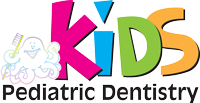07 Jun Primary Teeth: Why they need to be treated?
 While the majority of parents are fully aware about the importance of good primary teeth (also known as baby teeth, temporary teeth and milk teeth) care, some still ask: “Why do we need to treat them if they will fall out anyway?”
While the majority of parents are fully aware about the importance of good primary teeth (also known as baby teeth, temporary teeth and milk teeth) care, some still ask: “Why do we need to treat them if they will fall out anyway?”
To answer this, we will list below the key reasons why dental hygiene and dental care of primary teeth are extremely important to your child’s well being:
- REASON # 1: Primary teeth participate in the formation of speech and correct pronunciation of sounds.
Learning to speak clearly is crucial for cognitive, social, and emotional development. Early removal of severely decayed temporary teeth – which happens often due to baby bottle tooth decay, the most common cause of tooth decay in toddlers – leads to speech difficulties, including a lisp. - REASON # 2: Primary teeth “hold” a place for permanent teeth and stimulate the proper development of the jawbones. Left untreated, missing baby teeth cause the remaining teeth to “shift” and fill the spaces improperly. Thus, the crowding of teeth is formed; the development of bite is broken.
- REASON # 3: Immunity of the child. Badly decayed primary teeth can stimulate the beginning of childhood periodontal disease. As a result of this condition, oral bacteria invade and erode gums, ligaments, and eventually bone. Moreover, these bacteria produce various acids and toxins into the body and reduce the local and general immunity of the baby’s organism, increasing the likelihood of developing ENT diseases (angina, laryngitis), upper respiratory tract (bronchitis), as well as systemic autoimmune diseases: rheumatoid arthritis and acquired heart disease.
- REASON # 4: Nutrition. Baby teeth participate in chewing hard food. The well-chewed food is well digested and more fully absorbed by the body. Children with malformed or severely decayed milk teeth are more likely to experience deficiencies, malnourishment, and to be underweight.
- REASON #5: Aesthetics and self-confidence.
Children with healthy good-looking teeth feel more confident among their peers than children with unattractive teeth and crooked smiles. Taking good care of baby teeth can make social interactions more pleasant; reduce the risk of bad breath, and promote confident smiles and positive social interactions.
For all the above reasons, it is extremely important to take good care of primary teeth of your child. If you have any questions or concerns regarding baby teeth or baby teeth care, please contact our Pediatric Dentist Office in Allen, TX. Caring for the dental health of your children (from infants through adolescents) is the heart of our practice. We want to make sure your bay has healthy and beautiful smile for life!
Primary Teeth Related links:
http://www.kidspediatricdentistry.com/evolution-of-the-teeth/
http://www.dentalassociates.com/pediatric-dentistry/importance-baby-teeth/
http://cyberdentist.blogspot.com/2006/09/they-are-just-baby-teeth-why-fix-them.html
